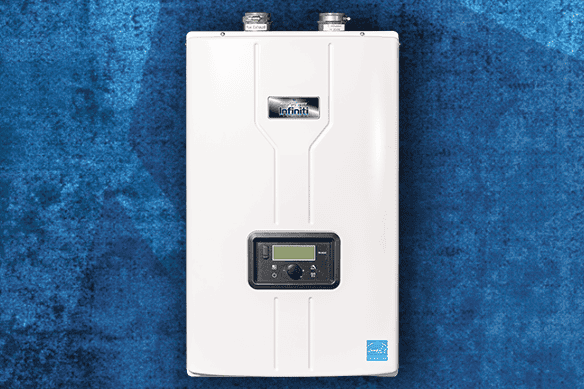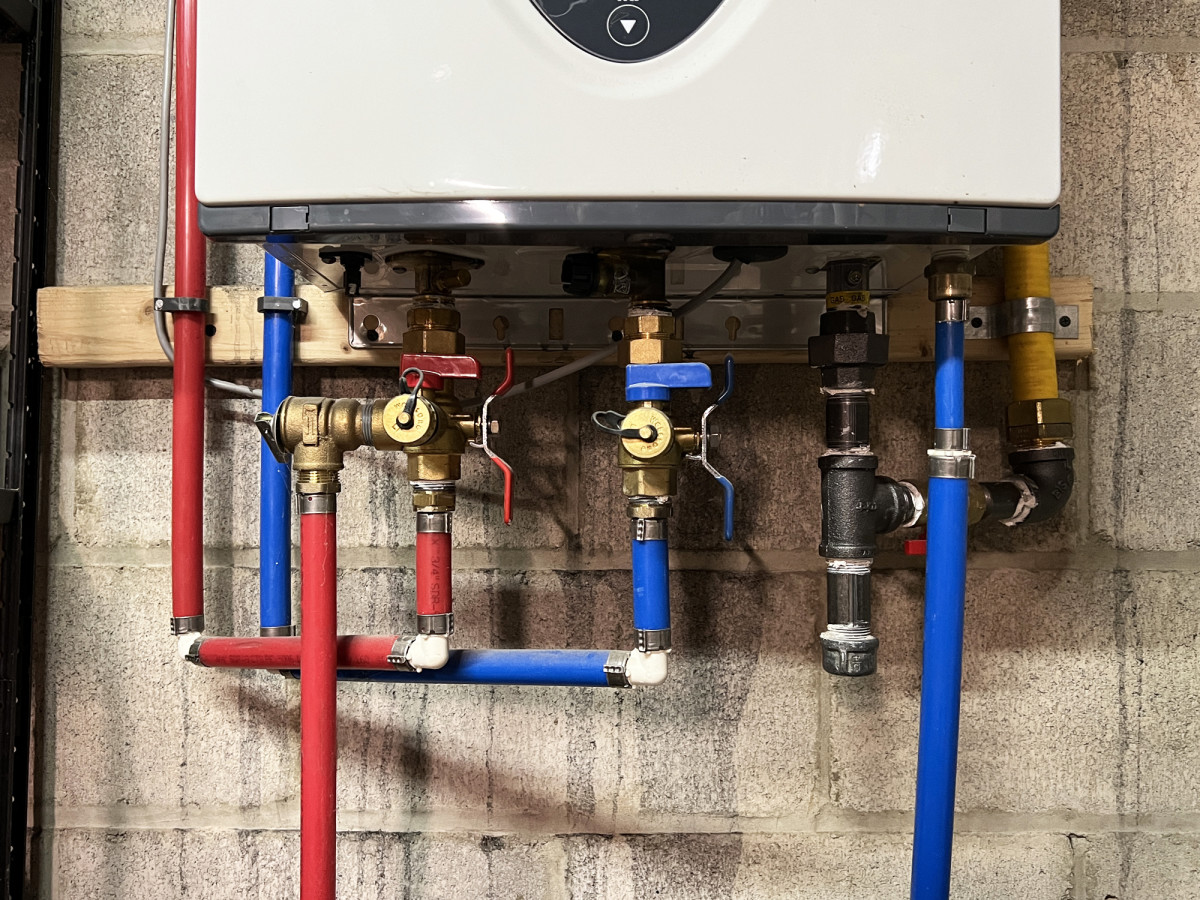My Way To Obtaining The Benefits Of Tankless Water Heaters
My Way To Obtaining The Benefits Of Tankless Water Heaters
Blog Article
They are making several good points regarding Six Benefits of a Tankless Hot Water Heater in general in the article which follows.

In a globe where comfort and effectiveness preponderate, it's no surprise that homeowners are continuously looking for smarter means to manage their home's power intake and convenience. One development that has actually progressively acquired appeal is the tankless hot water heater. But exactly what makes these systems stick out from the conventional tank-based models most of us grew up with? Let's dive in and check out the advantages of tankless hot water heater, helping you determine if it's time to make the switch in your house.
Intro
Picture this: you step into the shower after a lengthy day, anticipating a calming waterfall of warm water, only to be greeted by icy droplets since the last person used it all up. Sound acquainted? Typical water heaters store a fixed quantity of warm water, suggesting you go to the mercy of that storage tank's supply. Tankless systems, on the other hand, heat water on demand. Say goodbye to going out mid-shower, say goodbye to fumbling with timetables just to ensure hot water is offered.
Comprehending Tankless Water Heaters
What Are Tankless Water Heaters?
Tankless hot water heater, often called on-demand or instant hot water heater, provide hot water only as it's required. Instead of storing gallons of pre-heated water, these systems kick right into activity the minute you turn on the tap. Water passes through a warm exchanger, heating up in real-time, indicating you obtain an uninterrupted circulation of warm water without the requirement for a big storage tank sitting idly by.
How Do They Differ from Traditional Systems?
Standard heating systems hold a tank of hot water, using power to maintain that storage tank at a constant temperature. Tankless systems eliminate the standing supply, lowering thrown away energy and the cumbersome impact of a big cylinder. Essentially, you're upgrading from a "stockpile" frame of mind to a "made-to-order" technique.
Usual Sorts Of Tankless Devices
Tankless hot water heater normally can be found in two varieties: gas and electrical. Gas versions have a tendency to provide higher flow prices, perfect for bigger families, while electric versions typically offer smaller sized homes and are generally much easier to mount. Additionally, some systems are created for point-of-use (offering one fixture) while others can take care of the whole home's hot water demands.
Secret Benefits of Tankless Water Heaters
Power Efficiency and Expense Financial Savings
No more heating a titan tank's well worth of water and maintaining it warm throughout the day. Tankless heating units reduce standby energy losses, which can decrease energy costs. While the initial expense may be higher, the long-term cost savings usually warrant the financial investment.
3. Space-Saving Style
If your home is short on storage, getting rid of the bulky container maximizes important space. Tankless devices are portable and can typically be placed on walls, tucked away in edges, or set up in tight energy wardrobes without hogging the entire room.
4. Longer Lifespan
A well-kept tankless water heater can outlast its tank-based relative. Conventional containers might last 10-15 years, while tankless designs can keep downing along for two decades or more, making them a solid financial investment gradually.
1. Countless Hot Water Supply
Ever before needed to arrange showers so everyone gets their fair share of hot water? With tankless, that comes to be a thing of the past. As long as the heater's circulation capability isn't exceeded, you can take back-to-back showers without becoming a popsicle.
5. Improved Water High Quality
Keeping water in a container can often result in sediment accumulation or a somewhat "off" taste. With tankless systems, fresh water is heated up instantly, lowering the chances of debris buildup and potentially using cleaner-tasting water.
Factors to consider Before Changing
Though the benefits are engaging, it's important to think about a few factors before completely devoting.
Reviewing Your Home's Water Use Patterns
If your house at the same time uses multiple components with high warm water need, make sure the system's circulation price fulfills your demands. Recognizing your usage patterns assists you choose the appropriate size and type of tankless heater.
Maintenance and Care Tips
Tankless systems are fairly reduced upkeep, yet they aren't set-it-and-forget-it home appliances.
Routine Cleaning and Descaling
Tough water minerals can accumulate in the warm exchanger, influencing effectiveness. Routine descaling (frequently suggested every year) keeps the device running at peak performance.
Yearly Expert Inspections
A yearly checkup from a specialist makes sure small issues are caught early. They'll examine the device's efficiency, seek leaks, and aid preserve optimum performance.
First Financial Investment Prices
Tankless heating units normally come with a greater in advance cost. In between the unit itself and prospective setup adjustments, the preliminary expense may give you sticker shock. But remember to view it as a long-term financial investment.
Installation Requirements
Depending on your home's infrastructure, you could require additional electrical ability or gas line upgrades. Guarantee you comprehend the setup requirements and speak with an expert to stay clear of shocks.
Making Sure Appropriate Air Flow
For gas models, proper ventilation is necessary to securely remove exhaust gases. Ensure airing vent systems are clean and appropriately installed to avoid any kind of possible security risks.
Comparing Different Brands and Models
Not all tankless water heaters are produced equivalent.
Researching Reputable Makers
Try to find credible brand names with a background of creating quality units. A reputable manufacturer commonly supplies far better client support and longer service warranties.
Setup: DIY or Specialist?
While some property owners delight in tackling tasks themselves, tankless installation may not be the best time to burst out the toolbox.
Pros and Cons of DIY Installment
A DIY set up can save money, yet it comes with risks. Incorrect installment can result in ineffectiveness or safety concerns. If you come in handy and have experience, it could be viable-- yet wage care.
Checking Out Reviews and User Feedback
Individual reviews and feedback from next-door neighbors or friends that have actually gone tankless can supply useful understandings. In some cases, real-life experiences can be extra telling than advertising brochures.
When to Call a Specialist Plumbing
For most, calling a professional guarantees everything's done appropriately. An expert plumber understands neighborhood codes, sizing requirements, and airing vent criteria, lowering the danger of mishaps.
Taking full advantage of Efficiency
You've bought a tankless system-- now maximize its effectiveness.
Ideal Temperature Level Setups
The majority of people set their systems in between 120-140 F. Changing the temperature level can improve comfort and cost savings. Experiment to discover a sweet area that doesn't lose power.
Coupling With Low-Flow Fixtures
Intend to stretch your unit's capabilities? Think about mounting low-flow showerheads and faucets. They lower water usage, permitting your tankless system to deliver a constant stream of hot water without stressing.
Ecological Impact
Tankless water heaters line up with greener living objectives.
Decreased Carbon Footprint
By utilizing much less power and only home heating water as required, tankless systems can lower your home's carbon footprint, lowering your ecological effect.
Preserving Natural Resources
Less power usage and less lost hot water translate right into fewer natural deposits being used, an ecological win-win.
Who Profits Many from Tankless Heating systems?
The charm of tankless heating units is that they can fit a variety of houses.
Large Households vs. Single Passengers
Big families might enjoy the limitless hot water supply, while solitary occupants appreciate the energy financial savings from not heating an entire storage tank for just a single person's morning shower.
House Owners with Restricted Room
If your home is short on square video, losing the large storage tank maximizes room for other essentials-- or maybe simply a lot more breathing space.
Eco-Conscious Customers
Going tankless aligns with environmentally friendly worths, ensuring you're not wasting power or resources.
Future Fads in Tankless Hot Water Heater
The globe of home appliances is ever-evolving, and tankless hot water heater are no exemption.
Innovations in Modern technology
R&D is regularly improving warmth exchangers, making units a lot more efficient and resilient. Future designs could be also quieter, more compact, and much better matched for varying climates.
Smart Home Integration
Think of changing your hot water heater's temperature level by means of an application or receiving upkeep notifies on your phone. As smart home tech advancements, we'll see more connection and convenience.
Conclusion
Choosing a tankless hot water heater is greater than just updating your home's warm water system; it's investing in long-lasting convenience, power effectiveness, and a greener way of life. By considering your family's water usage, being mindful of installment needs, and dedicating to routine maintenance, you can enjoy a constant stream of hot water without the luggage of a large container. As innovation develops, you can look forward to also smarter, more efficient tankless solutions that not only make your life simpler yet likewise profit the world.
Pros and Cons of Tankless Water Heaters
Tankless Water Heater Pros
Saves Energy: Simply put, you re spending less energy to create hot water, so your total carbon footprint goes down, not to mention your bills. Lasts Longer Than Storage Tanks: Storage tank units need to be replaced every 15 years or so. But tankless units? They can last for 30 years before they give out on you. Constant Hot Water: Need to take a shower and don t want the water running cold? Awesome it won t. The water will stay hot the entire time because it creates hot water on demand. Saves You Money: Less water usage equals less money. Beyond that, you re not paying to keep water hot 24/7. Those savings add up quickly. Better for the Environment: Less water waste is better for everyone. It saves you money, but it s also environmentally conscious at the same time. Tankless Water Heater Cons
It Can Take a Minute: Depending on your specific unit and its placement, it can take anywhere from 10 seconds to 2 minutes to fully heat up. Because there s no storage tank, it heats water as you need it. Upfront Purchase Price: While we talked about their longevity, there s sticker shock when you look at brand-new tankless units to install. It pays for itself, but it s still a big chunk of change at first. Has its Limits: If you run multiple appliances at once, such as the dishwasher, washing machine, and maybe you take a shower at the same time, there might not be enough hot water. https://www.airsouthnow.com/blog/water-heater-service/pros-and-cons-of-tankless-water-heaters/

As a keen person who reads on Six Benefits of a Tankless Hot Water Heater, I was thinking sharing that article post was worthwhile. Do you know about another individual who is inquisitive about the niche? Please feel free to share it. I praise you for your time. Kindly stop by our website back soon.
Book With Us Today! Report this page